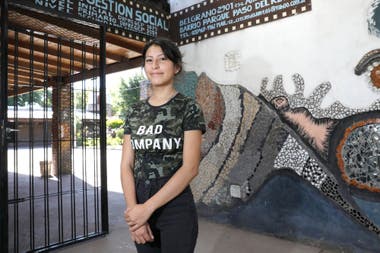“There is a lot of talk about inclusive education but little is practiced,” says Alicia (38), Valentino's mother, a five-year-old boy with a generalized developmental disorder. “Many schools do everything possible so that we fathers get tired and leave,” he says based on the experience he has had with his son since last year.
While
more and more children are included in common schools -that enrollment grew 400% in 15 years-, specialists and NGOs agree that the debt is still large in relation to the strategies and approaches they implement.
Until the age of four, Valen, as her parents call her, went to a maternity ward without a support teacher. Arriving at room four, began a new stage in a private school, which was attended by his older brother, in the neighborhood of Villa Lugano. Her parents and her therapeutic team decided that she had a support teacher who could help her face the new challenges, especially those related to social and behavioral issues.
A new school meant a huge change in his routine, a key element in his life and that of most children. Therefore, during the first days of class, neither their parents nor their therapists were surprised by the change in their behavior that became visible in a greater number of tantrums.

It was evident that Valentino needed some time to adapt to his new life, as well as the implementation of support to facilitate this process. However, according to his mother, from the beginning the school refused to make the adjustments that his son required and, on the contrary, focused on marking all the negative, what he did not achieve.
All the adjustments proposed by its integrator and therapeutic team were rejected by the school. Since not leaving it during the snack eat the only cookies that he liked (due to a problem that has food), or not allow him to have in hand an element that will help him to concentrate, to force the integrative teacher to retire with Valen to some tantrum and then prevent him from returning to class. Despite the intervention and explanations of the therapeutic team, the response of the school was always that they were whims and that the child should get used to it.
Added to this, the directors decided that the child had to enter and leave through a different door to the rest of the students. “At first I accepted but then I asked them to review their decision because I noticed that this affected Valen a lot because she wanted to go out with her classmates and cry for that reason, there was no case, they did not back down”, explains Alicia.
This rigidity on the part of the school, not only did not help Valentino, but it increased his discomfort. Another consequence was the discomfort and subsequent resignation of the first integrating teacher, after the second and, finally, the third. The bad predisposition of the school made his work impossible.
“This approach responds to a look focused on the deficit, on what the child lacks to be 'normal.' It is a normalizing or integrating model that underlies the idea that it is the child who has to strive to adapt to the school and not vice versa as the law dictates, “explains Gabriela Santuccione, coordinator of Grupo Article 24, a coalition of 170 NGOs for whom inclusive education involves a change of view, changing the focus of attention, placing emphasis on the context, not in the individual. That is, on how to eliminate barriers to learning, participation and presence.
Face prejudices
Although resolution 311/16 of the Federal Council of Education establishes that all schools have the duty to adopt the necessary measures to ensure that students with disabilities learn and participate in equal conditions, the history of Valen is repeated by thousands in our country .
That is why the Civil Association for Equality and Justice (ACIJ) and Article 24 Group decided to elaborate
a website with a practical guide that provides information on the obstacles that children and young people with disabilities face in school and on the tools that can be used to demand the effective fulfillment of the right to inclusive education.
“We seek to inform for action and for change, the site seeks to empower, dismantle prejudices and make schools spaces in which all children are welcome and feel valued,” explains Celeste Fernández, coordinator of the area of Disability and Human Rights of ACIJ.
Another decision made by the Valen school, which is one of the most frequent barriers that families of children with disabilities face, was to reduce the school day to two hours. “This situation, when it finds no basis other than disability, is discriminatory,” they explain from ACIJ and Grupo Article 24. They clarify that all persons with disabilities have the right to take all the subjects and participate in all those activities that take place within and outside of school, such as school events and educational or recreational outings.
“These decisions have a negative impact on the subjectivity of children, teachers must understand that the child with disabilities is a student and take responsibility for their learning,” says Fernandez.
While both Valen's parents and their therapeutic team agreed that the time reduction was not positive for the child, they were not heard. The school sheltered in the reports prepared by the psychologist of the institution, where all their difficulties were maximized, contradicting the opinion and diagnosis of the professionals who attended the boy, including his neurologist. “For example, they talked about aggressiveness when that was never a characteristic of Valen,” explains his mother.
Faced with this, they decided to file a complaint for discrimination in the Directorate General for Private Management Education (DEGEP) and in the prosecutor's office 22. In this regard, Fernández states: “It is very important that families claim for the rights of their children. When we denounce, we are changing school practices and cultures, which today exclude many students. “
Also many parents end up denouncing these discriminatory acts suffered in schools, in the National Institute against Discrimination, Xenophobia and Racism (Inadi). Last year, the agency received 2631 complaints, of which 20% had disability as its main motive.
Tired of a school that far from focusing on its strengths, it only saw its difficulties and that, without respecting its times and individuality, always chose to exclude it, the parents of Valen decided to change it from school. This is how they went through several schools and ran into another of the most common barriers: the refusal of a vacancy due to disability.
“They told me they were going to call me or that the quota was limited, and even one of the schools told us they did not belong, which is illegal,” says Alicia.
As established in resolution 311/16, schools can not refuse a child with a disability. As a result, they can not use the pretext of not being prepared or having the disability quota already covered, conditioning the enrollment in the results of medical diagnoses or imposing or suggesting referral to a special school.
“Forcing people to go to separate environments to educate themselves is to segregate,” explains Santuccione and adds: “We are forming a society that excludes a school that separates is a school that teaches to separate, the current school reproduces and generates exclusion.”
For the Coordinator of Group Article 24, it is a matter of political decision. “It is necessary that schools that reject a student for reasons of disability receive a sanction.Today discriminate for these schools has no cost,” he argues.
Currently, since they did not get a vacancy in any other school, Valen attends a five-room at the same institution. His family managed to attend the full afternoon shift from this year and to allow him to enter and leave through the same door as his classmates.
However, their parents, tired of so much struggle, yearn to find a school that can look at it in another way and look with creativity and professionalism the best way to accompany it in its growth.
According to specialists who participated in the third symposium on inclusive education that took place 15 days ago in Buenos Aires, the focus on the deficit is one of the main barriers when it comes to inclusion. On the other hand, another great obstacle is the arrogance of those schools that refuse to train because they believe and know everything.
In this regard José María Tomé, pedagogue and expert in inclusive education, believes that
there is no inclusive school but it is a permanent construction. And he emphasizes that the key is to generate spaces for reflection and teacher training.
The most common barriers
The eight most important barriers according to ACIJ and Group Article 24 consigned in the new site
- Exclude students with disabilities from school The schools can not argue that they are not ready or that the quota for students with disabilities is already covered, condition enrollment to psychopedagogical assessments, diagnostic results or the availability of support or impose double enrollment or mixed schooling, among others.
- Derive them to special school Any school or official that imposes or suggests the enrollment of students with disabilities in a special school incurs an illegal act. Parents have the right to choose their children's school. Inclusive education implies that all people are educated together and schools must adopt the necessary modifications for it.
- Support staff for inclusion The education system must ensure the availability of support personnel for inclusion that students with disabilities require during their school career. They can not deny the child's income for lack of support staff or demand support if the student does not require it. The support must work collaboratively with the teachers of the school.
- Refusing to implement accessibility measures, supports or adjustments Schools must adopt the necessary measures for students with disabilities to learn and participate in equal conditions: modify teaching strategies, offer different forms of communication in class (sign language, braille, etc.), modify infrastructure, reduce noise levels in the classroom, among others.
- Individual Pedagogical Project for Inclusion (PPI) Students have the right to have an Individual Pedagogical Project to ensure their inclusion at all levels of the common school. Not all people with disabilities need PPI, but if you need it you should have the opportunity to apply it in all curricular spaces, such as languages, physical education, areas of logic, mathematics, among others. The PPI does not mean exempting subjects or having low expectations of achievement.
- Reduction of working day Schools must allow the assistance of students with disabilities throughout the educational day. The reduction of working hours is a measure inherent to the integrative approach: when the school feels that it can not teach a person, it decides to exclude it instead of asking itself what it must do to guarantee its full participation.
- Impose a stay School teams can not impose or recommend that a person repeat the school year based on their disability.
- Evaluations and titles Students with disabilities will be evaluated according to their individual pedagogical plan (PPI) and will receive a primary and secondary degree as well as the rest of the students.
Where to report
Any person who faces any of these or other obstacles may file a claim in front of the school or before the Ministry of Education of their province. In addition, you can file a complaint with the National Institute against Discrimination, Xenophobia and Racism (INADI) 0800-999-2345 or on the National Coexistence Line: 0800-222-1197.
ALSO
.
Publicado en el diario La Nación




